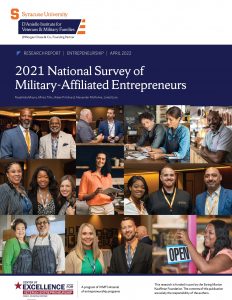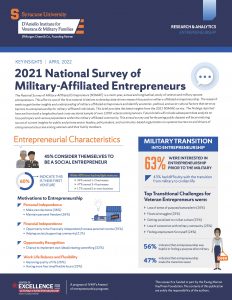Key Insights from the 2021 National Survey of Military-Affiliated Entrepreneurs
The National Survey of Military-Affiliated Entrepreneurs is a multi-year, annual and longitudinal, study of veteran and military spouse entrepreneurs. This effort is one of the first national initiatives to develop data-driven research focused on military-affiliated entrepreneurship. The research seeks to gain better insights and understanding of military-affiliated entrepreneurs and identify economic, political, and socio-cultural factors that serve as barriers to entrepreneurship for military-affiliated individuals. This brief provides the latest insights from the 2021 NSMAE survey. The findings reported here are from both a longitudinal and cross-sectional sample of over 2,000 veteran entrepreneurs. Future briefs will include subsequent data analysis on focused topics and various populations within the military-affiliated community. This annual survey and forthcoming public dataset will be an enduring source of current insights for public and private sector leaders, policymakers, and community-based organization on systemic barriers to and drivers of entrepreneurial success among veterans and their family members.
Entrepreneurial Characteristics
Motivations
Opportunity Recognition
Chance to implement own ideas/creating something
32%
Personal Independence
Make own decisions
36%
Maintain Personal Freedom
36%
Work Life Balance and Flexibility
Improving quality of life
26%
Having more free time/flexible hours
25%
Financial Independence
Opportunity to be independent/increase personal income
35%
Helping society/supporting community
21%
0
%
Consider themselves to be a social entrepreneur
0
%
indicate this is their first venture
0
%
have had multiple ventures
- 36% owned 1-2 businesses
- 47% owned 3-4 businesses
- 17% owned 5 or more business
Military Transition into Entrepreneurship
0
%
were interested in entrepreneurship prior to the military
0
%
had difficulty with the transition from military to civilian life
0
%
indicated that entrepreneurship was helpful in finding a purpose after military
0
%
indicated that entrepreneurship made the transition easier
Top Transitional Challenges for Veteran Entrepreneurs were:
Loss of sense of purpose/camaraderie
26%
Financial struggles
25%
Getting socialized to civilian culture
25%
Loss of connection with military community
25%
Finding employment for myself
24%
Business Characteristics, Growth, and Sales
The Nature of Business
In 2020, their businesses/ventures were:
- Profitable (52%)
- Breaking even (14%)
- Reporting a financial loss (34%)
Businesses/ventures were in
- Service-based business (57%)
- Both product and service-based business (31%)
- Product-based business (12%)
85% consider themselves successful entrepreneurs.
YET
56% depends on their top five customers, and in case they lost those top five customers they would either get out of business or would reap significant negative consequences.
Business Certifications
0
%
are formally or informally certified by a national, state, local certification body
0
%
find the process of obtaining certification to be difficult
0
%
Of those with certification, 49% generate revenue from clients that require certification(s)
64% are certified by Center for Verification and Evaluation, through the VA/Vets First (CVE).
61% are certified by Small Business Administration (SBA).
Top Business Designations:
Service-Disabled Veteran-Owned Businesses
71%
Veteran-Owned Businesses
65%
Small Business Certification
35%
Barriers to Entrepreneurship
Disability-Related Experiences
0
%
have a service-connected disability
0
%
indicate that service-related disability creates obstacles in their business
0
%
do not feel supported by Medical and Disability Service providers
0
%
entrepreneurship helped overcoming disability related challenges and barriers.
0
%
entrepreneurship helped with the recovery process
0
%
entrepreneurship played a significant role in my recovery process
Barriers to Entrepreneurship
0
%
Lack of access to capital
0
%
Problems finding good employees/contracted personnel
0
%
Lack of financing
0
%
Current economic situation
0
%
Irregular income
0
%
Federal regulations and policies
0
%
Taxes and legal fees
0
%
Lack of mentors for my business
0
%
Lack of experience in entrepreneurship or business ownership
The prevalence of certain problems and barriers faced by these veteran entrepreneurs changed dramatically between 2020 and 2021; when comparing the percentage of veteran entrepreneurs in our longitudinal study the biggest changes occurred:
| 2020 | 2021 | ||
| Problems finding good employees | 29.9% | 39.0% | 9.10% Increase |
| Dealing with federal regulations & policies | 16.5% | 27.8% | 11.30% Increase |
| Lack of financing | 37.5% | 24.1% | 13.40% Decrease |
Business Capital
Start Up
96% required initial start-up capital for their business venture.
0
%
of those required funding needed less than $25,000
0
%
of those required funding needed between $25,000 and $99,999
0
%
needed more than $100,000 initially to start or acquire a business
Growth
92% needed funding to expand or grow a business in 2020.
0
%
of those required funding needed more than $50,000
0
%
of those required funding needed more than needed more than $100,000
0
%
of those required funding were able to secure the funding needed to expand or grow the business in 2020
0
%
of those required funding were not able to secure any funding at all
Sources of Capital
80% of our respondents required financing in 2020.
0
%
personal and family savings of the owner
0
%
CARES Act’s Payroll Protection Program (PPP
0
%
business credit card
0
%
CARES Act’s Economic Injury Disaster Loans (EIDL)
0
%
personal credit cards
Startups (0-3 years old businesses)
Personal and family savings of the owner
71%
Personal credit cards
34%
CARES Act’s Payroll Protection Program (PPP)
16%
CARES Act’s Economic Injury Disaster Loans (EIDL)
15%
Businesses Older Than 3 Years
CARES Act’s Payroll Protection Program (PPP)
47%
Personal and family savings of the owner
42%
Business credit cards
33%
CARES Act’s Economic Injury Disaster Loans (EIDL
28%
54% applied for credit/financing with a lender or creditor.
Of that 54%…
0
%
were not declined by the lender or creditor
0
%
obtaining partial funding
0
%
were declined
- 61% did not reapply anywhere
- 28% were turned down by the same or different institution
Debt Overview
The average business debt of the respondents in 2020 was $191,686.
66% report business debt on credit cards.
0
%
have less than 10% of their business debt on credit cards
0
%
have 10-99% of their business debt on credit cards
0
%
report all (100%) their business debt to be on the credit cards
66% report business debt on credit cards.
0
%
pay an interest rate that is 10% or higher
0
%
pay more than 20% interest rate
How much stress does your business’ financial condition cause you?
No stress at all
18%
Not very much stress
20%
Some stress
40%
A great deal of stress
22%
Entrepreneurial Ecosystem
Finance
0
%
do not feel that capital is readily available
0
%
do not feel that the federal funding resources and support (PPP, EIDL, etc.) have been helpful to their business
0
%
are not aware of Community Development Financial Institutions (CDFI) resources
Government Support and Programs
0
%
find it difficult to cope with governmental bureaucracy
0
%
do not feel that there are enough adequate government programs to support their business
0
%
find it difficult to obtain licenses and permits
Community and Networks
0
%
feel responsible for their community
0
%
can find people in their local community to relate to
0
%
feel a sense of belonging in their local community
0
%
have difficulty navigating resources within their local community
Wellness
79% reported good to excellent general health while 21% reported poor or fair health.
Reported loss of energy either often or constantly during the past week
17%
Reported feeling burnout either often or constantly during the past week
17%
Reported difficulty concentrating either often or constantly during the past week
19%
During past year 4% considered attempting suicide.
Of that 4%…
0
%
sought help
0
%
did NOT seek help
Covid-19
were able to successfully adapt their business during the pandemic
87%
were able to accommodate remote work
79%
lost business
64%
identified additional opportunities for their business during the pandemic
56%
Download Full Report
Download Infographic


